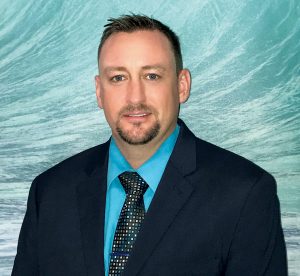 After Detective Jesse Gossman earned his bachelor’s degree in public safety administration, he knew he wanted to take his education to the next level. However, he wasn’t sure a traditional path in criminal justice or law school was in his future. Instead, the detective wanted to study a subject that would broaden his career possibilities, both within and outside of law enforcement.
After Detective Jesse Gossman earned his bachelor’s degree in public safety administration, he knew he wanted to take his education to the next level. However, he wasn’t sure a traditional path in criminal justice or law school was in his future. Instead, the detective wanted to study a subject that would broaden his career possibilities, both within and outside of law enforcement.
“When it came time to look at graduate programs, I wanted to see what’s out there to further my interests and give me the most options,” says Gossman, member of Florida Lodge #31 and a 10-year veteran with the Fort Lauderdale Police Department.
With that as his motivation, Gossman decided to expand on his interest in financial crimes and graduated in August 2017 with an executive master of accounting with a concentration in forensic accounting from Florida Atlantic University (FAU).
Why did you choose FAU?
FAU is local and I liked the aspect that you can attend courses in person [because] I learn better when I’m in classes in person. Also, it was nice that it was flexible with my schedule changing. I knew I didn’t want to be penalized if I couldn’t make it to class. They allow you to view the courses and lectures online and have the option to show up to class.
What were your favorite courses?
I enjoyed the federal tax course because they’re similar to reviewing laws. Tax codes are similar to looking at criminal statutes and I can apply my experience.
In your opinion, what is the relationship between accounting and law enforcement?
I think the skill set accountants have is that they understand the numbers, but that doesn’t necessarily translate into investigations. Accountants have to build skills with people and investigation skills as well as with the legal side and what is expected in the courtroom. That’s foreign to accountants. From the law enforcement side, it’s the opposite. You have already built skills in investigation with people and understand what courts are looking for. That really helps when investigating fraud. It’s not just about numbers; you have to interview people and be able to read them.
Have you been able to apply what you learned to the job?
Shortly after I started the program, I transferred to the economic crimes unit. A lot of what I learned in school has really helped me in my current role. I have a much deeper understanding. Also, it adds a lot of credibility when I’m speaking with a CEO, CFO or CPA because I have the background and know the lingo.
Do you think having a background in accounting has made you a better law enforcement professional?
To investigate these crimes, you almost need to have a good accounting knowledge base. You need to be well-versed in IT as well because, from the criminal perspective, everything is digital.
Has the emergence of cryptocurrencies changed how you investigate economic crimes?
Cryptocurrencies are very big, and I think that’s where this is going. You have to keep up on the latest technology. There are always changes and that is one of the issues because, as law enforcement, we’re often behind the power curve.
Do you have any plans for additional education?
I’m hoping to continue on. I have a few credits I need to qualify for the CPA exam.
What advice would you offer law enforcement professionals who might be considering a degree in forensic accounting or fraud investigation?
For people who have a desire, economic crimes is one of the most challenging crimes to investigate because it’s always changing. But educating myself and moving forward is worthwhile.
For more about FAU, plus other forensic accounting and fraud investigation degree programs, read “Follow the Money.”




